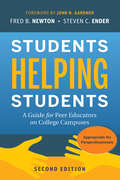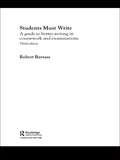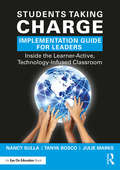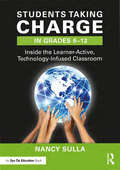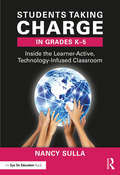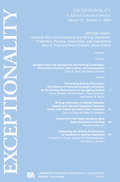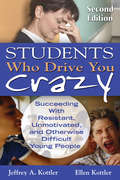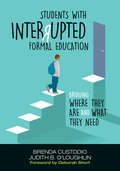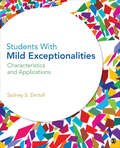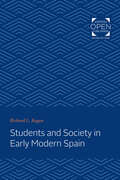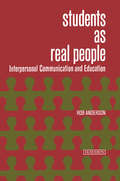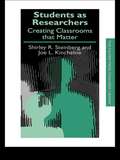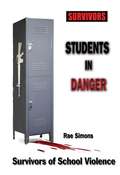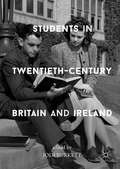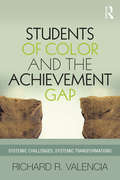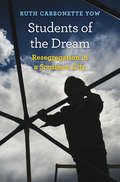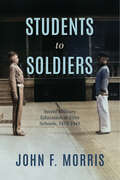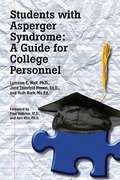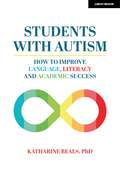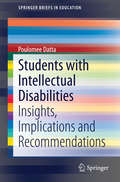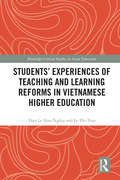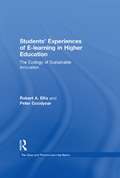- Table View
- List View
Students Helping Students
by Steven C. Ender Fred B. Newton John N. GardnerThis practical guide is considered the standard for training the thousands of college students who serve as leaders, tutors, counselors, and advisors for their peers. Beginning with a fundamental discussion of student growth and development and current research on the topic, the authors go on to provide learning objectives and exercises to help prepare peer educators for such tasks as tutoring, student orientation, residence hall advising, crisis intervention, coaching, and more.
Students Must Write: A Guide to Better Writing in Coursework and Examinations
by Robert BarrassThe third edition of this well-respected guide will help students of all subjects to write more clearly and more effectively, with valuable advice on how to: make good notes find information, cite sources and list references write better coursework assignments achieve higher grades in tests and examinations prepare a well-organised dissertation, long essay, term paper, project report or thesis write effective letters and applications. Written by an esteemed author with many years of experience of helping students improve key writing skills, this text also includes straightforward guidance on word choice and the new challenges and opportunities afforded by the use of computers. Exercises are also provided for students to put the theories into practice, either individually or in group work.
Students Taking Charge Implementation Guide for Leaders: Inside the Learner-Active, Technology-Infused Classroom
by Nancy Sulla Tanya Bosco Julie MarksLead your organization to implement innovative learning environments in which students take ownership so they can achieve at high levels and meet rigorous standards. Students Taking Charge Implementation Guide for Leaders shows you how to inspire, coach, and support teachers to create student-driven classrooms that empower learners through problem-based learning and differentiation, where students pose questions and actively seek answers. Technology is then used seamlessly throughout the day for information, communication, collaboration, and product generation. You’ll find out how to: Inspire the adaptive change at the core of the Learner-Active, Technology-Infused Classroom, aimed at engaging students; Understand the structures needed to support its implementation and empower teachers and students; Employ leadership strategies that will move teachers and students from engagement to empowerment to efficacy. This new implementation guide for school leaders offers a more detailed look into the key mindset shifts that are critical for leaders of a Learner-Active, Technology-Infused School. With the book’s practical examples and step-by-step guidelines, you’ll be able to help your teachers implement innovative classrooms immediately.
Students Taking Charge in Grades 6–12: Inside the Learner-Active, Technology-Infused Classroom
by Nancy SullaDiscover how to design innovative learning environments that increase student ownership so they can achieve at high levels and meet rigorous standards. Students Taking Charge shows you how to create student-centered classrooms that empower learners through problem-based learning and differentiation, where students pose questions and actively seek answers. Technology is then used seamlessly throughout the day for information, communication, collaboration, and product generation. You’ll find out how to: Design an Authentic Learning Unit, which is at the core of the Learner-Active, Technology-Infused Classroom, aimed at engaging students; Understand the structures needed to support its implementation and empower students; Build the facilitation strategies that will move students from engagement to empowerment to efficacy. This new 6–12 edition offers a more detailed look into secondary school implementation. With the book’s practical examples and step-by-step guidelines, you’ll be able to start designing your innovative classroom immediately!
Students Taking Charge in Grades K-5: Inside the Learner-Active, Technology-Infused Classroom
by Nancy SullaDiscover how to design innovative learning environments that increase student ownership so they can achieve at high levels and meet rigorous standards. Students Taking Charge shows you how to create student-driven classrooms that empower learners through problem-based learning and differentiation, where students pose questions and actively seek answers. Technology is then used seamlessly throughout the day for information, communication, collaboration, and product generation. You’ll find out how to: Design an Authentic Learning Unit, which is at the core of the Learner-Active, Technology-Infused Classroom, aimed at engaging students; Understand the structures needed to support its implementation and empower students; Build the facilitation strategies that will move students from engagement to empowerment to efficacy. This new K–5 edition offers a more detailed look into elementary school implementation. With the book’s practical examples and step-by-step guidelines, you’ll be able to start designing your innovative classroom immediately!
Students Who Are Exceptional and Writing Disabilities: Prevention, Practice, Intervention, and Assessment:a Special Issue of exceptionality
by Gary A. Troia and Steve GrahamThis special issue examines four critical aspects of writing instruction for students with disabilities: prevention, classroom practice, instruction, and assessment. The first article addresses writing strategy instruction for young students at risk for long-term writing difficulties. Next special and general education middle school educators' epistemology is explored regarding writing development and instruction, their self-reported teaching practices, and the challenges they faced as they strive to teach middle school students how to effectively use writing as a communicative medium and learning tool. The third, article reviews and critiques state writing standards and describes an instructional plan to help students with disabilities and other struggling writers master composing strategies and processes that may equip them to meet state standards in writing. Finally, a review is presented of the extant research on various methods of writing assessment, including holistic, primary trait, and analytic scoring methods, with particular emphasis on Curriculum-Based Measurement--an assessment technique well suited for children and youth in special education.
Students Who Drive You Crazy
by Jeffrey A. KottlerOutlines strategies teachers can use to succeed with difficult and hard to motivate young people.
Students Who Drive You Crazy: Succeeding With Resistant, Unmotivated, and Otherwise Difficult Young People
by Ellen Kottler Dr Jeffrey A. KottlerTake a proactive approach with your most challenging students! This second edition of a bestseller gives teachers a model to assess, understand, and respond to challenging students, plus new tables, charts, and reflection questions. Offering real-life scenarios from interviews with teachers, counselors, and school administrators, this updated volume provides: More tips for developing active listening skills that improve communication with students Suggestions for creating caring communities in the classroom A new section on dealing with aggressive and violent behavior Information on understanding parent behavior and suggestions for building positive connections with parents and families
Students With Interrupted Formal Education: Bridging Where They Are and What They Need
by Brenda K. Custodio Judith B. O′LoughlinNew hope for our most vulnerable English learners "One of the guiding principles of effective English language teaching is for educators to know their students. And that in a nutshell captures the value of this book. . . . The compassion that Custodio and O’Loughlin feel for our SIFE students, the commitment they have to educating them well, and the comprehension they have of the assets these learners bring to the classroom are evident in the writing, tools, and vignettes they share." -Deborah J. Short Under the best of circumstances, the academic demands of today’s classrooms can be daunting to our English learners. But for the tens of thousands of newly arrived students with interrupted formal education, even the social challenges can be outright overwhelming. Rely on this all-in-one guide from Brenda Custodio and Judith O’Loughlin for expert insight on how to build the skills these students need for success in school and beyond. Inside you’ll find Essential background on factors leading to interrupted education Specific focus on refugee children and Latino immigrants Guidance on building internal resilience for long-term social and emotional health Recommendations for creating supportive environments at the classroom, school, and district level About one thing, Brenda and Judith are absolutely convinced: our SIFE students can learn and make progress, often at a remarkable speed. But it’s up to us, their educators, to provide the time, attention, and a specific focus. Consider this book your first step forward.
Students With Interrupted Formal Education: Bridging Where They Are and What They Need
by Brenda K. Custodio Judith B. O′LoughlinNew hope for our most vulnerable English learners "One of the guiding principles of effective English language teaching is for educators to know their students. And that in a nutshell captures the value of this book. . . . The compassion that Custodio and O’Loughlin feel for our SIFE students, the commitment they have to educating them well, and the comprehension they have of the assets these learners bring to the classroom are evident in the writing, tools, and vignettes they share." -Deborah J. Short Under the best of circumstances, the academic demands of today’s classrooms can be daunting to our English learners. But for the tens of thousands of newly arrived students with interrupted formal education, even the social challenges can be outright overwhelming. Rely on this all-in-one guide from Brenda Custodio and Judith O’Loughlin for expert insight on how to build the skills these students need for success in school and beyond. Inside you’ll find Essential background on factors leading to interrupted education Specific focus on refugee children and Latino immigrants Guidance on building internal resilience for long-term social and emotional health Recommendations for creating supportive environments at the classroom, school, and district level About one thing, Brenda and Judith are absolutely convinced: our SIFE students can learn and make progress, often at a remarkable speed. But it’s up to us, their educators, to provide the time, attention, and a specific focus. Consider this book your first step forward.
Students With Mild Exceptionalities: Characteristics and Applications
by Professor Sydney S. ZentallThis concise and practical guide thoroughly presents the characteristics of children with specific mild exceptionalities in today's diverse classroom. Using an active, problem-solving approach that reflects how today's students learn, Dr. Sydney S. Zentall identifies the characteristics of children with mild exceptionalities that can be gleaned from observations, written descriptions, and personal interactions. Unlike many texts on this topic, which overwhelm students with extraneous information, The text focuses on the characteristics of these students within general education and special class settings. With this knowledge readers will better understand the implications of characteristics for accommodations and be ready to apply this knowledge with empirically based interventions.
Students and Society in Early Modern Spain
by Richard L. KaganOriginally published in 1974. The close connection between universities and bureaucratic institutions such as church and state was perhaps first noticed by Max Weber. Such institutions, he observed, require a dependable source of cadres to run them. Thus, the size and composition of university enrollments are often a function of bureaucratic needs. Richard Kagan examines the dynamics of this relationship historically by racing the growth and decline of the university system in Castile, the heart of the Spanish monarchy, between 1500 and 1809. This period marked the emergence of a strong Habsburg state and a militant Catholic church, both of which looked to the universities for "educated" men. Accordingly, the universities grew rapidly, and by 1600 Castile was perhaps the best-educated kingdom in Europe. But this did not last. Jobs were increasingly filled through nepotism, causing students to abandon the universities in search of other careers. By 1700, the universities were small, backward institutions. Kagan begins by examining the nature and position of primary, secondary, and university institutions in Hapsburg Spain, concentrating on the extent and purpose of literacy. In Part II, Kagan discusses the growth and development of the ruling hierarchies in the bureaucratic world and gives special consideration to the criteria used to recruit officials. The author concludes with an assessment of the impact of bureaucratic changes in church and state on the universities of Castile. The data he collects on changes in the curriculum, the professorate, and the social and geographical backgrounds of the students are used to support hypotheses about the spectacular rise and collapse of university education in Spain, the process of modernization, the development of bureaucracies, and the crisis of the Spanish monarchy. Students and Society in Early Modern Spain demonstrates that institutions of higher learning often collapse when they become over-professionalized and fail to respond to changing conditions. Thus, Kagan provides a study of education and social change—of why educational institutions are central to a society in one century but only peripheral to it in the next. The author casts new light not only on the short lived educational revolution of the sixteenth century but also on education in other societies, both past and present.
Students as Real People: Interpersonal Communication and Education
by Rob AndersonA teacher of communication expresses his concern for thousands of students who are cheating themselves out of a worthwhile education by falling into the accepted role of “nonperson” uninvolved in the education process. In this book, the author fosters a belief that success or failure in college depends on communication—“interdependent efforts of people in a relationship to generate common meaning.” He proposes to get students to realize that their education is something other students can help them develop, as much as teachers. The author uses a personal style of writing to talk with the students. He uses examples from the students’ immediate campus environment in challenging them to question their roles in the educational process. Written for and tested in interpersonal communication courses, the book is also appropriate for teacher education courses, “orientation to college life” courses, and for college counseling centers.
Students as Researchers: Creating Classrooms that Matter (Teachers' Library)
by Shirley R. Steinberg Joe L. KincheloeThis book focuses directly on student empowerment through meaningful research. It fills a specific gap in educational literature by making explicit the relationship between teaching method, classroom practice, and the production of knowledge. Drawing on the best of theoretical innovations over the last decade Students as Researchers places them in a living accessible context. With a sound basis in theory, the book is also extremely practical and accessible for students, giving scenarios and examples that can be used to reveal the workings and benefits of research.
Students in Danger: Ordinary People, Extraordinary Circumstances)
by Rae SimonsSchool is supposed to be a safe place where students and their friends can study and learn about the world around them. But what about when it isn't safe? School shootings like those in Columbine and Virginia Tech have made many fearful about what might happen at school. For others, bullying has made school a nightmare place they dread going to every day.
Students in Twentieth-Century Britain and Ireland
by Jodi BurkettThis book explores the experiences and activities of students across the twentieth century and throughout the United Kingdom and Ireland. The daily experiences of students, their involvement in local communities, national political organisations and widespread cultural changes, are the main focus of this ground-breaking book. It takes students themselves as the subject of inquiry, exploring the fundamental importance of student activities within wider social and political changes and also how some of the key changes across the twentieth century have shaped and changed the make-up, experiences, and lives of students. This book charts the experiences of students throughout a period of unprecedented change as being a student in Britain and Ireland has gone from the endeavour of a small number of elite, mainly wealthy white men, to an important phase of life undertaken by the majority of young people.
Students of Color and the Achievement Gap: Systemic Challenges, Systemic Transformations
by Richard R. ValenciaStudents of Color and the Achievement Gap is a comprehensive, landmark analysis of an incontrovertible racialized reality in U.S. K-12 public education---the relentless achievement gap between low-socioeconomic students of color and their economically advantaged White counterparts. Award winning author and scholar Richard Valencia provides an authoritative and systemic treatment of the achievement gap, focusing on Black and Latino/Latina students. He examines the societal and educational factors that help to create and maintain the achievement gap by drawing from critical race theory, an asset-based perspective and a systemic inequality approach. By showing how racialized opportunity structures in society and schools ultimately result in racialized patterns of academic achievement in schools, Valencia shows how the various indicators of the achievement gap are actually symptoms of the societal and school quality gaps. Following each of these concerns, Valencia provides a number of reform suggestions that can lead to systemic transformations of K-12 education. Students of Color and the Achievement Gap makes a persuasive and well documented case that school success for students of color, and the empowerment of their parents, can only be fully understood and realized when contextualized within broader political, economic, and cultural frameworks.
Students of the Dream: Resegregation In A Southern City
by Ruth Carbonette YowMarietta High, once a flagship public school northwest of Atlanta, has become a symbol of the resegregation that is sweeping across the American South. Ruth Carbonette Yow argues for a revitalized commitment to integration, but one that challenges many orthodoxies of the civil rights struggle, including colorblindness.
Students to Soldiers: Secret Military Education at Elite Schools, 1815–1945
by John F. MorrisAn expansive study of the brutal rites of initiation at elite institutions that shaped young men into military leaders Informed by his own experience as a cadet at West Point, John Morris offers the first transnational history of student life at elite military preparatory institutions in Europe and America and the unofficial, underground rituals, practices, and codes that formed a crucial part of the education there. Comparing British public schools, the monarchical cadet schools in Imperial Germany, Austria, and Russia, and the US Military Academy over the course of the nineteenth and into the twentieth century and the world wars, Morris presents critical insights on the unsanctioned methods employed to transform young students into leaders of men. Extracurricular traditions—including but not limited to severe hazing—Morris argues, shaped the officers-in-training much more than their official courses of study. He also shows how romantic and sexual relations between boys facilitated the cultivation of hypermasculinity at these institutions. Students to Soldiers offers a fascinating glimpse into the lives of the budding military elites of Europe and America, both unpacking the arcane rituals that eventually became codified into honored traditions and analyzing their influence over the long term.
Students with Asperger Syndrome: A Guide for College Personnel
by Lorraine E. Wolf Jane Thierfeld Brown G. Ruth Kukiela BorkFor many students with autism spectrum disorders, getting admitted to college is the easy part. Surviving and succeeding can be quite another, as these students transition into a system that is often unprepared to receive them. Accommodating students whose disabilities very likely fall in social and self-regulatory areas is a particular challenge for disability services providers who are not used to reaching out into so many areas of student life. This comprehensive book offers disability services professionals practical strategies for accommodating and supporting students in all phases of college life and beyond.
Students with Autism: How to improve language, literacy and academic success
by Katharine BealsBeals describes the root causes of the language and learning challenges in autism, their various academic consequences, and a variety of tools and strategies for addressing them. Drawing on what the most current evidence shows about the nature of autism and which therapies are most successful, the book discusses the implications for autism-friendly instruction in academic subjects, noting the ways in which today's classrooms come up short, and suggesting various adjustments that teachers can make.Instead of focusing on social and behavioral issues, general accommodations, and general ways to address learning difficulties, Beals zeros in on academics, on accommodations within specific academic subjects, and on techniques that target autism-specific deficits, situating the issue of educational access within the broader context of disability rights, neurodiversity, and debates about what disability rights and neurodiversity should encompass.Complete acceptance of individuals on the autism spectrum must include complete educational access. This means rethinking assumptions about autistic students, about how we teach expressive language, about how we teach reading comprehension, and about what and how we teach in the many K-12 classrooms attended by autistic students.
Students with Autism: How to improve language, literacy and academic success
by Katharine BealsBeals describes the root causes of the language and learning challenges in autism, their various academic consequences, and a variety of tools and strategies for addressing them. Drawing on what the most current evidence shows about the nature of autism and which therapies are most successful, the book discusses the implications for autism-friendly instruction in academic subjects, noting the ways in which today's classrooms come up short, and suggesting various adjustments that teachers can make.Instead of focusing on social and behavioral issues, general accommodations, and general ways to address learning difficulties, Beals zeros in on academics, on accommodations within specific academic subjects, and on techniques that target autism-specific deficits, situating the issue of educational access within the broader context of disability rights, neurodiversity, and debates about what disability rights and neurodiversity should encompass.Complete acceptance of individuals on the autism spectrum must include complete educational access. This means rethinking assumptions about autistic students, about how we teach expressive language, about how we teach reading comprehension, and about what and how we teach in the many K-12 classrooms attended by autistic students.
Students with Intellectual Disabilities
by Poulomee DattaThis book investigates the self-concept of the students with intellectual disabilities who were placed in specialist and mainstream educational settings in South Australia. It gains insights into what students with intellectual disabilities felt about themselves and their achievements across the different dimensions of self-concept. It is divided into two stages of execution. In Stage 1, the Tennessee Self-Concept questionnaire was administered to students with intellectual disabilities. In Stage 2, interviews were conducted with students with intellectual disabilities, their parents and teachers. These data reflected a range of viewpoints from which to examine the research questions. These findings have implications for teachers, special educators, policy makers and a range of professionals in the education and special education sector in enabling greater understanding of the problems experienced by these students and pointing to modifications and improvements in the services for these students.
Students' Experiences of Teaching and Learning Reforms in Vietnamese Higher Education (Routledge Critical Studies in Asian Education)
by Ly Thi Tran Tran Le NghiaLocated within the global changing contexts of higher education in the 21st century, this book examines the reform of the teaching and learning practices in Vietnamese universities under the Higher Education Reform Agenda and the influence of internationalization on the higher education sector. Specifically, it analyses the motives, current implementation, effectiveness, and challenges of these reforms, especially from student perspectives. Analyzing approximately 4300 survey responses and interviews with students, the book covers a range of key issues related to teaching and learning in higher education which have attracted attention in recent years, including: The learning environment Student support and first-year transition Student-centred teaching The use of credit-based curricula The use of information and communication technology At-home internationalization of higher education Assessment and feedback Work placements Informal learning via extra curricular activities Students’ perception of the values of university education.
Students' Experiences of e-Learning in Higher Education: The Ecology of Sustainable Innovation (Open and Flexible Learning Series)
by Robert Ellis Peter GoodyearStudents’ Experiences of e-learning in Higher Education helps higher education instructors and university managers understand how e-learning relates to, and can be integrated with, other student experiences of learning. Grounded in relevant international research, the book is distinctive in that it foregrounds students’ experiences of learning, emphasizing the importance of how students interpret the challenges set before them, along with their conceptions of learning and their approaches to learning. The way students interpret task requirements greatly affects learning outcomes, and those interpretations are in turn influenced by how students read the larger environment in which they study. The authors argue that a systemic understanding is necessary for the effective design and management of modern learning environments, whether lectures, seminars, laboratories or private study. This ecological understanding must also acknowledge, though, the agency of learners as active interpreters of their environment and its culture, values and challenges. Students’ Experiences of e-learning in Higher Education reports research outcomes that locate e-learning within the broader ecology of higher education and: Offers a holistic treatment of e-learning in higher education, reflecting the need for integrating e-learning and other aspects of the student learning experience Reports research on students’ experiences with e-learning conducted by authors in the United States, Europe, and Australia Synthesizes key themes in recent international research and summarizes their implications for teachers and managers.
